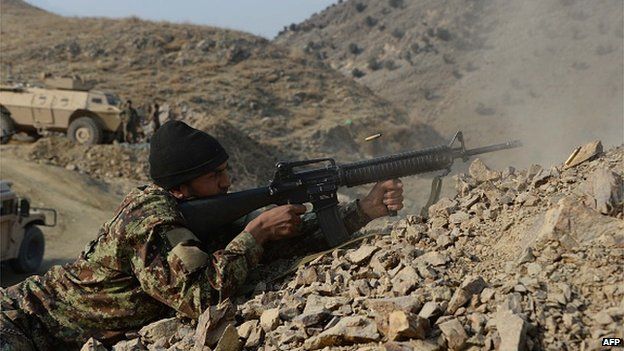After 14 years of brutal conflict, the possibility for peace in Afghanistan may be peaking through the battlefield smoke. After doggedly pursuing negotiations with the Taliban for the duration of his nine-month presidency, Ashraf Ghani has finally achieved a breakthrough, beginning what his government called the “first ever official peace talks” between the two sides in July 2015.
The talks come at a time when the Taliban, as well as critical regional players like Pakistan, India, and China, has a heightened interest in Afghan stability.
For the government in Kabul, the peace talks are critical. The Taliban insurgency has not only hampered political and economic growth, but the militants also control significant portions of the country. The Taliban’s annual spring offensive has been the fiercest in recent years, acquiring additional territory and inflicting heavy casualties on government forces.
With a weak and divided central government, Kabul has been caught flatfooted by the Taliban’s offensive. The Taliban’s near seizure of Kunduz, a city in the far north of the country, illustrated the indecisiveness of Ghani’s government. Moreover, its continued inability to secure parliamentary approval of a defence minister reflects its fragile political standing, while also producing leadership and coordination problems in the Afghan military. This has contributed to the Taliban’s recent advances.
Despite these military successes, the Taliban appears willing to engage in negotiations. While the Taliban’s agreement to talk may seem counterintuitive in light of its battlefield successes, the group is internally fractured and faces external pressure and territorial competition from the Islamic State (IS), all of which enhances the appeal of a political settlement.
According to an unnamed Taliban official, military and political progress are intertwined. The Taliban estimates that a favourable deal can be reached from a position of military strength.
The arrival of IS in Afghanistan, in particular, likely spurred the Taliban’s move to the bargaining table. The Taliban fears an expanded IS presence in the country would represent a vigourous and well-funded alternative to its own insurgency, which would potentially fuel defections and hinder recruitment efforts. By reaching a political settlement, the Taliban can consolidate its relatively strong position and avoid losing influence and territory to IS.
However, the emergence of IS could also damage peace prospects. The Taliban is moderating some hardline stances, in a gradual move towards political pragmatism. This minor softening has contributed to internal divisions within the group, as more conservative factions are unwilling to make concessions for peace. Given the inherent compromises that come with peace negotiations, these factions may be drawn towards IS.
The recently announced death of Taliban leader Mullah Mohammed Omar has also contributed to internal fissures. These leadership disputes could split the group into dueling peace and war camps, which could act as a brake against peace talks with the Afghan government.
While it has for long supported the Taliban as a means of countering Indian influence in Afghanistan, Pakistan hopes to avert a breakdown in negotiations. Islamabad has shifted its stance towards the Taliban’s insurgency, as it believes a neutral but peaceful Afghanistan is preferable to a Pakistan-friendly one at war.
Following the Peshawar school massacre in December 2014, in which the Pakistani Taliban murdered more than 130 children, Pakistan has become increasingly apprehensive of a blowback effect arising from its support of the Afghan Taliban and of increased cooperation between the Afghan and Pakistani Taliban factions. As a result, Pakistan is pushing to end the insurgency, and it has facilitated talks by bringing some Taliban members to the peace table.
Additionally, Islamabad fears that growing Taliban power will lead Kabul to seek closer military ties with India to combat the insurgency, giving rise to Pakistan’s long-term fears of Indian “encirclement”.
India also welcomes peace talks, as they could serve to curb regional extremism and Pakistani influence while bringing stability to Afghanistan. India has been historically anti-Taliban, supporting the rival Northern Alliance and the government in Kabul. During the Taliban’s rule in Afghanistan at the end of the 1990s, terrorism in India was at its peak. Therefore, ending the insurgency is a key Indian security interest.
New Delhi also has substantial economic interests in Afghanistan, where it has invested more than $1 billion in aid and pledged an additional $2 billion. As well, the government envisions a gas pipeline running from Turkmenistan through Afghanistan and Pakistan to India, which would satisfy the country’s growing thirst for energy. Ending the Taliban insurgency is critical to the success of these projects.
The Chinese, too, have a vested interest in halting conflict in Afghanistan. As concerns over terrorism in China’s Muslim-populated province of Xinjiang grow, Beijing has been expanding its regional influence in an attempt to stop the spread of Islamic extremism, including its “New Silk Road” development initiative. Like India, China has significant investments in Afghanistan’s mineral and energy sectors that will become more profitable if the country stabilizes. In an effort to encourage a political settlement, Beijing has facilitated peace talks between Afghan and Taliban officials, and increased aid to Afghanistan.
Notwithstanding substantial prodding from major regional actors, a peaceful outcome in Afghanistan is far from certain, especially given recent stalls and doubts that the Taliban’s full leadership is on board with negotiations. To make the most of this opportunity, the United States and other NATO member states contributing to Afghan security should support the peace process by continuing their financial and military support for Kabul.
The U.S. should also use its substantial financial leverage to ensure Pakistan continues its support for the peace talks, as Islamabad has played spoiler in the past. To assuage Pakistan’s fears of an Indo-Afghan alliance, the U.S. should seek to prevent India’s military funding to Afghanistan and work to balance Indian and Pakistani strategic concerns.
While much work must be done to end this enduring conflict, the involved parties must remain committed to peace. If not, the economic, political, and human costs of continued war will only increase.



